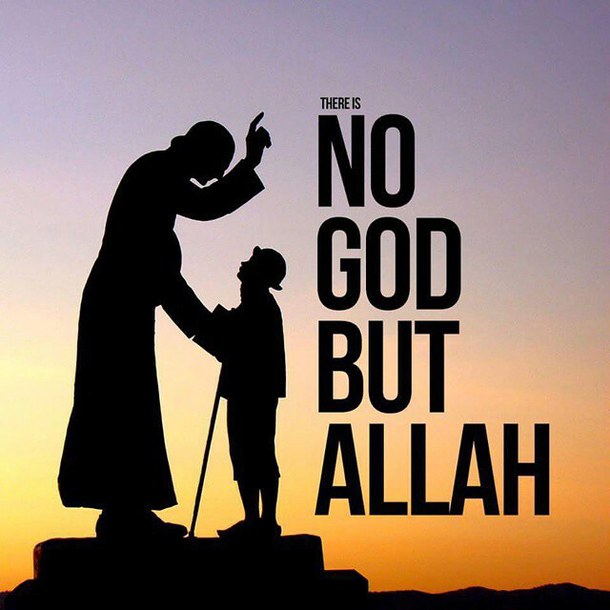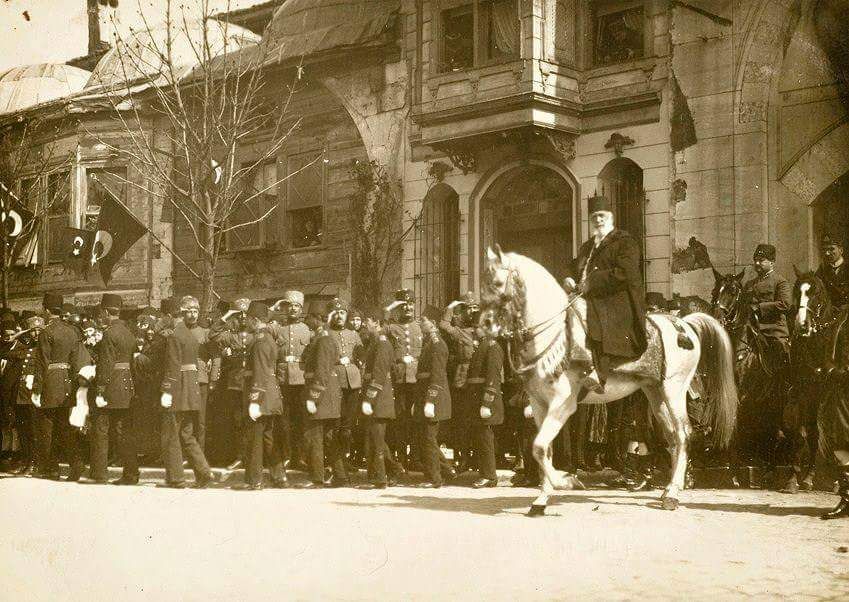بسم الله الرحمن الرحيم

Narrated by Aisha (Allah be pleased with her) : The Prophet (ﷺ) said, “The most hated person in the sight of Allah is the most quarrelsome person.” (Bukhari)
(Tartib al-Madarik)
Ameen.
I'm for the truth no matter who tells it. I'm for justice no matter who it is for or against. I'm a human being first and foremost and for whoever benefits humanity...

Narrated by Aisha (Allah be pleased with her) : The Prophet (ﷺ) said, “The most hated person in the sight of Allah is the most quarrelsome person.” (Bukhari)
(Tartib al-Madarik)
Ameen.
بسم الله الرحمن الرحيم
Is every child born a Muslim?
Abu Hurayrah (Allah be pleased with him) narrates, the Prophet (Allah’s peace and blessing be upon him) said, ‘Every child is born in a state of fitrah, and then his parents make him into a Jew, a Christian or a Magian.’ (Bukhari & Muslim).
The Hadith does NOT say every child is born a “Muslim.” The word fitrah can be translated as ‘natural disposition’ or ‘natural instinct’; upon this understanding one can take fitrah to be in some sense a kind of innate characteristic. This Hadith is commonly misunderstood, it does not mean every child is born a Muslim. What it actually means is, every child is born upon nature. And the natural state of every human being is one of clarity, purity, of being in a pristine form, of being unpolluted and unadulterated by external factors. That natural state is conducive to a person accepting Islam and inclines one towards the beauty of Islam. But not exactly makes him a Muslim. As that child grows up those external factors influence him. If the external factor is corrosive and corrupting, they will becomes disinclined towards Islam. But they will not made apostates in childhood. The full Hadith narrated by Imam Bukahri, Imam Malik, Imam Muslim and Imam Ibn Hibban continues… The Prophet asked the Sahabah, “Do you see any animal mutilated when it is born?” Then the Sahabah asked, “What if that child died in his infancy?” The Prophet replied, “When Allah created them Allah knew best what they were going to do.” *End of the Hadith.*
If every child was born a Muslim, there would have been no need for the Sahabah to ask that question: “What if that child died in his infancy?” As all babies are born Muslim – but this is incorrect. We abstain from commenting on the children of the Christians, Jews, and polytheists who die in infancy.
If every child WAS born a Muslim, we could use the term “revert” when they revert back to Islam. But every child is born upon Fitrah, which means they are ‘inclined’ towards Islam, BUT NOT BORN MUSLIM as many assume. Had they all been born Muslim, this would mean they left Islam i.e. became Murtad (apostate) and then returned back to Islam. My question is when did they become Murtad? The answer is never. Hence it is wrong to use the term “revert.”
So every child is not born a Muslim, please see video for further misunderstood verses by Shaykh Riyadh Haq:
Please click here
Also, https://www.islam21c.com/theology/am-i-a-convert-or-a-revert/
حَدَّثَنَا الْقَعْنَبِيُّ، عَنْ مَالِكٍ، عَنْ أَبِي الزِّنَادِ، عَنِ الأَعْرَجِ، عَنْ أَبِي هُرَيْرَةَ، قَالَ قَالَ رَسُولُ اللَّهِ صلى الله عليه وسلم ” كُلُّ مَوْلُودٍ يُولَدُ عَلَى الْفِطْرَةِ فَأَبَوَاهُ يُهَوِّدَانِهِ وَيُنَصِّرَانِهِ كَمَا تَنَاتَجُ الإِبِلُ مِنْ بَهِيمَةٍ جَمْعَاءَ هَلْ تُحِسُّ مِنْ جَدْعَاءَ ” . قَالُوا يَا رَسُولَ اللَّهِ أَفَرَأَيْتَ مَنْ يَمُوتُ وَهُوَ صَغِيرٌ قَالَ ” اللَّهُ أَعْلَمُ بِمَا كَانُوا عَامِلِينَ ”
Abu Hurairah reported the Messenger of Allah (May peace be upon him) as saying :
Every child is born on Fitrah (inclination towards Islam), but his parents make him a Jew and a Christian, just as a beast is born whole. Do you find some among them (born) maimed? The people asked : Messenger of Allah! What do you think about the one who died while he was young? He replied : Allah knows best what he was going to do. (Abu Dawood)
Ismail Ibn Nazir Satia (one who is in dire need of Allah’s forgiveness, mercy and pleasure)
8 Rajab 1439

Question
Du’as are accepted on a Wednesday from between Dhuhr to ‘Asr. Is this correct?
Answer
This is based on the following Hadith:
Sayyiduna Jabir (radiyallahu’anhu) reports that:
‘Rasulullah (sallallahu ’alayhi wasallam) had made du’a to Allah in Masjidul Fath (in Madinah) on a Monday, a Tuesday and a Wednesday. His du’a was accepted between Dhuhr and ‘Asr on the Wednesday.’ Sayyiduna Jabir (radiyallahu’anhu)says: ‘Whenever I had a need, I waited for that moment on a Wednesday and made du’a. Every time I did so, I noticed my du’a being accepted.’
(Al-Adabul Mufrad of Imam Bukhari, Hadith: 725, Musnad Ahmad, vol.3 pg. 332 and Musnad Bazzar; Kashful Astar, Hadith: 431)
‘Allamah Mundhiri (rahimahullah) has declared the chain of Musnad Ahmad as good (jayyid) (Targhib, Hadith: 1788. Also see Majma’uz Zawaid, vol.4 pg.12)
Moulana ‘Abdul Hayy Laknawi (rahimahullah) has stated that ‘Allamah Suyuti graded the narrators of this Hadith as good (jayyid) in his book: ‘Sihamul Isabah’ and Shaykh Samhudi (rahimahullah) -in Wafaul Wafa- declared the narrators in Musnad Ahmad as reliable. (Al-Fawaidul Bahiyyah, pg.185-186)
Benefit of starting the lesson of a book of Islamic study on a Wednesday
Question
Are there any Hadiths regarding the virtue of beginning things (such as a book) on the day of Wednesday. If so can you mention the Hadith, along with its authentication and reference?
Answer
To commence a book of knowledge on a Wednesday has been the practice of the scholars for centuries.
The Author of Al-Hidayah, the Hanafi fiqh masterpiece would also do so, and he would quote a Hadith to support it.
(Al-Fawaidul Bahiyyah, pg.32 and 185. Also see Al-Maqasidul Hasanah, Hadith: 943)
Although the latter day Muhaddithun could not locate the chain for this specific narration, this practice is still substantiated by other Hadiths whose broader meaning do lend it support.
1. The Gem of the last century, Shaykh ‘Abdul Hay Al-Laknawi (rahimahullah) has written the following:
‘I have managed to deduce a basis for this from the Hadith recorded in Bukhari’s Al-Adabul Mufrad and in Musnad Ahmad and Musnad Bazzar from Jabir (radiyallahu’anhu) who said:
‘Rasulullah (sallallahu’alayhi wasallam) had made du’a to Allah in Masjidul Fath (in Madinah) on a Monday, a Tuesday and a Wednesday. His du’a was accepted between Zuhr and ‘Asr on the Wednesday. Sayyiduna Jabir says: ‘ Whenever I had a need, I waited for that moment on a Wednesday and made du’a. Every time I did so, I noticed my du’a being accepted.’
‘Allamah Suyuti graded the narrators of this Hadith as good (jayyid) in his book: ‘Sihamul Isabah’
Shaykh Samhudi (rahimahullah) -in Wafaul Wafa- declared the narrators in Musnad Ahmad as reliable.
This Hadith points to the fact that on Wednesdays, there is a moment in which du’as are accepted. Therefore they (the Scholars) liked to commence their lessons on this day.
Since those who commence any task, generally make du’a for its easy and speedy completion, their du’as will be accepted on this day and their tasks shall be completed.’
(end of quote from Shaykh Laknawi’s (rahimahullah) book: Al-Fawaidul Bahiyyah, pg.185-186)
2. Shaykh Laknawi (rahimahullah) then cites further substantiation for this practice from Shaykh Ibn ‘Arraq Al-Kinani (rahimahullah), the author of Tanzihush Shari’ah. The summary of which is:
The Sahih Hadith (in Muslim) states that Allah Ta’ala created divine light (nur) on Wednesday, and knowledge is also termed as nur, It is therefore suitable to start our acquisition of this nur on the same day. Especially since Allah Ta’ala says: ‘…and Allah will definitely complete his nur’ (Surah Tawbah, Ayah: 32)
Conclusion
Commencing Islamic study on a Wednesday indeed has support from the Hadith and the constant practice of the ‘Ulama throughout the centuries, and is therefore recommended.
However, this does not forbid commencing the lesson on another day.
And Allah Ta’ala Knows best.
Answered by: Moulana Muhammad Abasoomar



Riba means an increase in a particular item. The word is derived from a root meaning increase or growth. Allah, may He be exalted, says (interpretation of the meaning): “Whatever you pay as interest so that it may increase (li yarbu) the wealth of people does not increase (fa la yarbu) in the sight of Allah” [al-Room 30:39]., i.e., it does not increase or rise in status before Allah.
Riba originated among the people of the Jaahiliyyah; if a debt became due, they would say to him (the borrower): Give us one hundred (that is due, now), or increase it to one hundred and fifty (and pay later). Then when the one hundred and fifty became due, they would say: Give us one hundred and fifty (now), or increase it to two hundred (and pay later) — and so on.
Islam also forbade another kind of riba, namely riba al-fadl, which means adding to the amount when exchanging one item for another of the same type. So if gold is sold for gold, that is not permissible except like for like, hand to hand. Islam stipulated that the exchange should be done hand to hand and that the items or goods should be of the same quality. Whoever gives more or asks for more has engaged in riba. If he sells a saa‘ of wheat for two saa‘s (of the same commodity), even if it is hand to hand, he has engaged in riba.
The principle of the circulation of capital exists in both the Muslim world and the non-Muslim world. What it means is circulating capital so that it will increase. The same applies to lending; they give money as a loan provided that it will increase when they get it back. Such transactions are undoubtedly riba.
2) All kinds of commercial insurance are based on nothing but gambling which is haraam according to the Qur’an:
“O you who believe! Intoxicants (all kinds of alcoholic drinks), and gambling, and Al-Ansaab (stone altars for sacrifice to idols etc.) and Al-Azlaam (arrows for seeking luck or decision) are an abomination of Shaytaan’s (Satan’s) handiwork. So avoid (strictly all) that (abomination) in order that you may be successful” (al-Ma’idah 5:90 – interpretation of the meaning).
All kinds of insurance are kinds of playing with chances. They tell you, Pay this much money, then if this happens to you we will give you this much. This is pure gambling. Insisting on differentiating between insurance and gambling is pure stubbornness that is unacceptable to any sound mind. The insurance companies themselves admit that insurance is gambling.
3) All kinds of insurance are forms of uncertainty, and transactions which involve uncertainty are forbidden according to many saheeh ahaadeeth, such as the hadeeth narrated by Abu Hurayrah (may Allah be pleased with him):
“The Messenger of Allaah (peace and blessings of Allaah be upon him) forbade transactions determined by throwing a stone and transactions which involved some uncertainty.” (Narrated by Muslim).
[“Transactions determined by throwing a stone” – this was a type of transaction that was prevalent in the markets of pre-Islamic Arabia, whereby a stone was thrown by either the buyer or the seller, and whatever it touched, its transaction became binding. “Transactions which involved some uncertainty” – is a transaction in which there is no guarantee that the seller can deliver the goods for which he receives payment. Footnotes from the translation of Saheeh Muslim. (Translator)].
All forms of commercial insurance are based on uncertainty of the most extreme kind. Insurance companies and those who sell insurance refuse to insure cases except where there is clear uncertainty in whether or not the condition being insured against will happen or not. In other words, the condition being insured against must have a possibility of happening or not happening (as opposed to, for example, someone who has a pre-existing condition, such as a person who is on death row applying for life insurance–translator.) Moreover, this transaction involves something uncertain, which is when an accident will happen and the extent of the damage caused. Hence insurance combines three kinds of extreme uncertainty.






This poem was written to create awareness for mental health illnesses.
 I am a Muslim. I am British.
I am a Muslim. I am British.